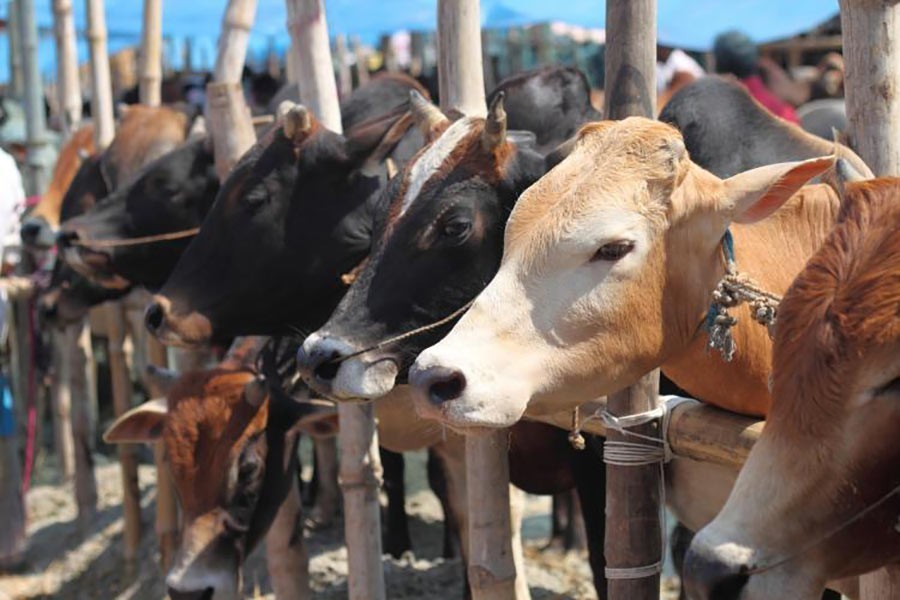Following days of uncertainty, the two city corporations have finally settled for 11 Eid cattle markets in Dhaka this year. Of them 8 will be operated by DSCC (Dhaka South City Corporation) and 3 by DNCC (Dhaka North City Corporation). Besides, preparations are being taken to arrange a number of digital sacrificial cattle markets. Earlier, the higher authorities decided not to allow any physical cattle market within the precincts of the capital in the current year. Detecting lukewarm response from the general people to online cattle purchase, they had brought the traditional cattle markets under wider focus. However, their total number dwindled from 22 fixed before uncertainties and oscillations. According to the original plan, DSCC was set to operate 13 markets and DNCC 9. According to insiders, the number of cattle markets to be set up in Dhaka may undergo yet another phase of change.
Eid-ul-Azha is the second largest religious festival of the Muslims. The reason for not arranging the sacrificial cattle markets much in advance was conspicuous --- keeping the spread of Covid-19 oubreak at bay. Had the decision of not organising cattle markets in the capital remained in place, it would have been the first time in the history of Dhaka that its residents preferred physical safety to visiting the stiflingly crowded cattle markets and getting infected with deadly viruses.
However, according to the native Dhaka residents, the Eid-ul-Azha celebration remains incomplete unless one chooses his sacrificial animals from a traditional cattle market. According to safety-conscious people, by allowing the cattle markets to go ahead like in the other years, the authorities may have resorted to a costly mess-up in the making. Once a cattle market opened to public, it would be difficult to impose much restriction on it. Finding it to be a highly delicate issue involving religious sentiments, few in the authorities seemed prepared to talk about the dreaded spread of the pandemic virus from the traditionally unwieldy 'haats'. This year, the policymakers ought to have been extra-pragmatic and assertive on the question of allowing these markets. Local sponsors of many of these 'haats' have for decades been organising them in the densely populated neighbourhoods. If they go ahead with it this year too, dust-laden air partly heavy with the Covid-19 virus is feared to pollute the market atmosphere. Few seem to be bothered --- neither the organisers or traders, nor the buyers and the profit-seeking sellers. Most of them come to the city from the poverty-stricken rural areas.
However, the decision not to arrange the 'haats' in the capital would have saddened many. Being unable to buy the sacrificial animals from a large market amounts to their being deprived of a significant volume of festivity andthe piety related to this ritualistic sacrifice. The bargaining, purchase and finally taking the animals home are associated with the whole process of the sacrifice, ending in the 'qurbani' on the Eid day. Lots of people do not find any difference between the observance of this Eid-ul-Azha and those observed in the pandemic-free years in the past. These people appear to be living in a world not plagued by the anxieties of the ongoing pandemic ordeal.
It needs not be explained in detail that the frenetic enthusiasm of crowds of people over purchasing a cow or a couple of goats helps to spread the dreadful corona virus. On finding themselves caught in the nearly inescapable maze of people, many intending buyers might become compelled to defy the health guidelines in place. Moreover, the task of obliging people to keep social distance at cattle markets is a pipedream. By discouraging people from following the age-old method of buying sacrificial animals from a crowded cattle market in the pandemic time, the corporations would have been due for plaudits. Weighing the pros and cons of the sensitive issue, the higher authorities at one time began mulling to urge people to purchase their sacrificial animals online, as there might not be the age-old cattle markets this year.
The sensible segments of Dhaka-dwellers would have welcomed the decision not to organise traditional Eid cattle markets in the current year. It would not have detracted from the quintessential spirit of the religious occasion. The Holy Hajj didn't take place with the presence of Muslims from all corners of the world last year. With the Covid-19 still ravaging the world, the scenario is set to return also this year. Since the pilgrims have sincerely 'intended' to perform the Hajj, their preparations and other endeavours may not go in vain.
Likewise, a purely wise and noble purpose must have been at work behind the decision not to hold any open-air cattle market in the capital this year. But the authorities had to give in to the public demand. The arrangements of government-recognised cattle markets now a reality, the whole process is feared to be beset with a number of adversities. As it is yet to be known if the present 'hard lockdown' would remain in place in the run-up to the Eid cattle markets, worries over bringing the animals to Dhaka from distant rural farms haunt both the traders and buyers. This is a kind of dilemma which needs to be ironed out without delay. Or else, in a confused situation, the capital may have to put up with roadside makeshift cattle markets. However, those serious about maintaining health protocols are expected to stick to online purchases.


